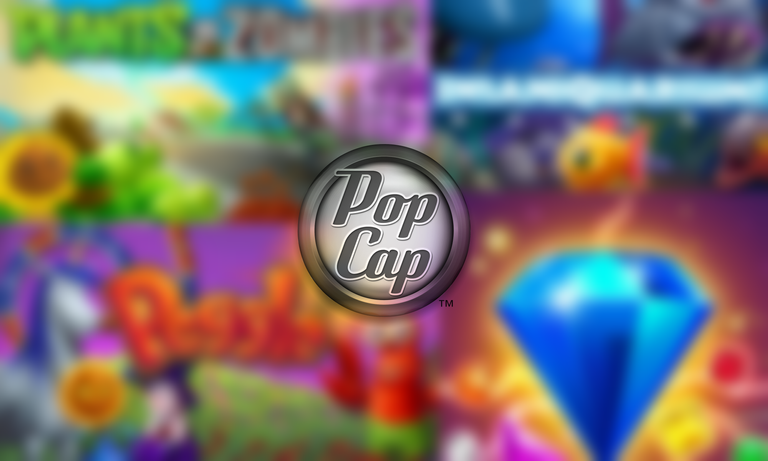To create a video game and have it be an instant hit is one thing, to keep creating a series of video games that still receive critical acclaim is another. But to have your video games become multi-hit wonders, and have a special place down everyone's memory lane catapults a studio to completely legendary league.

Inbetween its formation in 2000, until it's acquisition by EA in 2011, Pop Cap had created multiple titles that are still in great momentum today. Titles I need not even mention, the names of which have already popped in your head: Plants Vs. Zombies, Bejeweled, Insaniquarium, Zuma and many more that have solidified Pop Cap as a leader in the casual gaming portion of the industry.
How did they do it?
Just how did they gentrify the casual gaming market, and still be memorable a decade later? Part of their success could be attributed to their minimalist visual, as well as gameplay, design philosophy. At the time of Pop Cap's advent, the casual gaming market lacked that Zen-like simplicity, with the most prominent games on the shelf having a challenging but ultimately repetitive playthrough in nature. Other lesser titles at the time were just plain soulless and uninspired. Pop Cap sought to change this.
If you played any two games made by Pop Cap, you'll immediately notice that the continuous introduction of new elements, mechanics or items upon beating a level is an overarching theme in all of their games. This game design serves to create anticipation for whatever is behind an obstacle or a challenge, compelling the player to ford through those in order to satisfy that anticipation.
This game design is constructed in such a way such that the setting gameplay mechanics are the same, but variety is absolutely championed in order to create unique experiences during each level. As such, creativity is what makes or breaks a game under this design.
An exemplary case in point where this design was implemented %100 is Plants Vs. Zombies: A universal setting and game mechanic was established all throughout the game, with the only variety there being the new plants you get, and the zombies that march through your lawn. This was winded as long as possible, until the last level. Another one is Insaniquarium, with the same thought pattern behind everything in it.
Stripping away the veil of nostalgia from the aforementioned examples, these games are just as solid as they were the day they were shipped; they are timeless. In the video game industry, the cheapest way to maintain relevance and timelessness for your game is through political assertions and predictions. MGS2 had achieved this effect for itself through a singular instance of dialogue that does not even make up %0.9 of the entire game's manuscript. However, the alternative to that move is by going down the expensive route of pristine game design, essentially what Pop Cap had achieved.
An abrupt end to an era in the making
That all came to an end after EA had sat its eyes on the flourishing studio, and the rest is agonizing history. Pop Cap has since been reduced to a mere mobile game development front, producing shovelware.
EA business model is rooted in its strategy of embracement, expanding and extinguishing the studios it buys out or merges with, a strategy that maximizes cashflow. This is the crux as to why so many people boycott EA for, because that strategy essentially hinders and clashes with the creative process of these respective studios, if not outright rendered docile and inactive.
Herein lies the overarching problem with EA: On top of bringing shareholders who only see things in cash terms to the creative sphere, its a plague. EA is the dangling blackhole under the video games industry that's going to engulf it, destroy it, make it soulless, render it charmless. We are already seeing that happen with the many iterations of Plants Vs. Zombies. Seriously, can you even keep count of what is happening to this game beyond the original?
EA is a monopoly-oriented company. Perhaps even the first company in this industry to have such a monopoly in the branding of the myriad franchises they have under their belt. A creative industry such as this was never meant to be viewed in a predominantly business-like point of view. Its incompatible, but this is the reality of the situation.
A boycott is impossible given this monopoly of franchises. If ever a boycott does form a large enough crowd and attract manifold media attention, it only has a very fleeting dent on the company itself. This is true, because when both the producing studio and the publishing front are as tightly-knit as they are in this case, you end up unintentionally boycotting the wrong people. When that happens, when the community or the crowd have it their way, the subsequent productions of that studio are going to become warped and clearly made to pander to the community damage-control style.
Conclusion
I remember playing their games on our family computer. The first one that has taught me the joys of video games was Plants Vs. Zombies, with its flagship Zen-like game design, simplicity in gameplay and visuals, ensnaring music all throughout. It was a magical experience, even more so by today's standards, and I say this as I keep the veil of nostalgia off.
Nowadays, everybody seems to be heading off into the distance in utilizing the latest thingy-majig or the newest gizmo in their highly complex video games, when, in reality, they've simply forgotten just how amazing it is to be effortless, and nobody knew that better than Pop Cap.